module 4
Module4各单元知识梳理-五年级英语下学期(牛津上海版试用本)
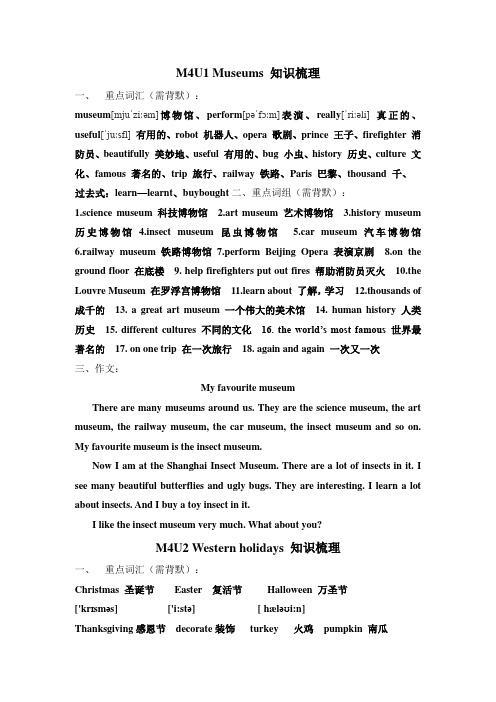
M4U1 Museums 知识梳理一、重点词汇(需背默):museum[mjuˈziːəm]博物馆、perform[pəˈfɔːm]表演、really[ˈriːəli]真正的、useful[ˈjuːsfl]有用的、robot 机器人、opera 歌剧、prince 王子、firefighter 消防员、beautifully 美妙地、useful 有用的、bug 小虫、history 历史、culture 文化、famous 著名的、trip 旅行、railway 铁路、Paris 巴黎、thousand 千、过去式:learn—learnt、buybought二、重点词组(需背默):1.science museum 科技博物馆2.art museum 艺术博物馆3.history museum 历史博物馆4.insect museum 昆虫博物馆5.car museum 汽车博物馆6.railway museum 铁路博物馆7.perform Beijing Opera 表演京剧8.on the ground floor 在底楼9. help firefighters put out fires 帮助消防员灭火10.the Louvre Museum 在罗浮宫博物馆11.learn about 了解,学习12.thousands of 成千的13. a great art museum 一个伟大的美术馆14. human history 人类历史15. different cultures 不同的文化16. the world’s most famous 世界最著名的17. on one trip 在一次旅行18. again and again 一次又一次三、作文:My favourite museumThere are many museums around us. They are the science museum, the art museum, the railway museum, the car museum, the insect museum and so on. My favourite museum is the insect museum.Now I am at the Shanghai Insect Museum. There are a lot of insects in it. I see many beautiful butterflies and ugly bugs. They are interesting. I learn a lot about insects. And I buy a toy insect in it.I like the insect museum very much. What about you?M4U2 Western holidays 知识梳理一、重点词汇(需背默):Christmas 圣诞节Easter 复活节Halloween 万圣节['krɪsməs] ['i:stə] [ hæləʊi:n]Thanksgiving感恩节decorate装饰turkey 火鸡pumpkin 南瓜[,θæŋks'gɪvɪŋ]['dɛkə,reɪt] ['tɝ:kɪ] ['pʌmpkɪn]western 西方的ja cko’lantern 南瓜灯['westən] [dʒæk əu 'læntən]二、重点词组(需背默):on this holiday 在这个节日、Easter egg 复活蛋、Easter egg hunts 寻找复活节彩蛋、on a Sunday in March or April 在三月或四月的一个周日、eat chocolate eggs 吃巧可力蛋、on the 31st of October 在十月三十一日、make jacko’lanterns 做鬼火灯笼、go trickortreating 不给糖就捣乱、eat pumpkin pies and pumpkin bread 吃南瓜派和南瓜面包、on the fourth Thursday of November 在十一月的第四个周四、have a family dinner 进行家庭聚餐、eat turkey and pumpkin pies 吃火鸡和南瓜饼、on the 25th of December 在十二月二十五日、decorate a Christmas tree 装扮圣诞树、give presents to each other彼此赠送礼物、Dragon Boat Festival 端午节、Chinese festival 中国节日、Western holidays 西方节日、make pumpkin pies 做南瓜派、have ‘fancydress’ parties 举行化装舞会、dress like animals 打扮成动物样子、play a trick on them 戏弄他们三、重点句型(需背默):1.Everyone in the UK likes Christmas.在美国每个人都喜欢圣诞节。
外研版九年级英语上册Module 4 知识汇总
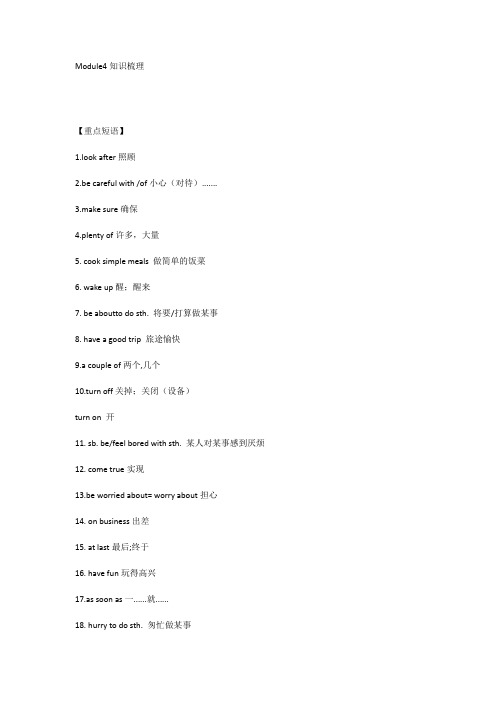
Module4知识梳理【重点短语】1.look after照顾2.be careful with /of小心(对待).......3.make sure确保4.plenty of许多,大量5. cook simple meals 做简单的饭菜6. wake up醒;醒来7. be aboutto do sth. 将要/打算做某事8. have a good trip 旅途愉快9.a couple of两个,几个10.turn off关掉;关闭(设备)turn on 开11. sb. be/feel bored with sth. 某人对某事感到厌烦12. come true实现13.be worried about= worry about担心14. on business出差15. at last最后;终于16. have fun玩得高兴17.as soon as一......就......18. hurry to do sth. 匆忙做某事19. ask sb. for sth.向某人要某物20. hand in上交18. be unable to do sth.不能做某事19. feel tired and sleepy 感到又累又困20. help sb. with sth. =help sb. (to) do sth.21. tidy up收拾;整理22. Plan to do sth. 计划/打算做某事22. depend on依靠;依赖;取决于23. say goodbye to sb.和某人道别24. see sb.off送别某人25. be busy doing sth.be busy with sth.26. be /get readyfor sth. 为某事准备好be/get ready to do sth. 准备好做某事27. get sth.ready 把某物准备好We must get dinner ready. The guests are coming. 28. in a hurry 匆忙hurry up 赶快29. by accident= by chance 意外地,偶然地30. later on以后,后来31. take away 拿走,带走32. in danger 处于危险中33. all day long整天34. point out 指出35. call the police 报警36. clean up清理37. fight with 与……打架【用法集萃】1. so+be动词/助动词/情态动词+主语........也是如此2. so+形容词/副词+that从句如此......以至于3. lots of+可数名词复数/不可数名词许多......4. advise sb. to do sth.建议某人做某事5. be about to do sth.即将做某事6.want to do sth.想要做某事7. a bit+形容词/副词有点.....8. have to do sth.不得不做某事9. a few+可数名词复数几个......10.be unable to do sth.不能做某事11. try to do sth.设法做某事12. want sb to do sth.想让某人做某事13. start to do sth.开始做某事14. be happy to do sth.做某事很高兴15. tall sb. to do sth.告诉某人做某事16. learn to do sth.学会做某事17. be busy doing sth.忙于做某事【话题写作】1、今天是6月21日,父亲节。
高一英语外研版必修4module4教案
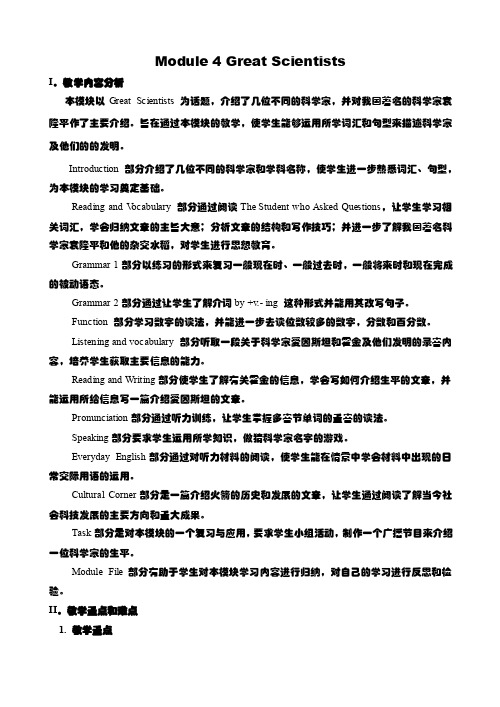
Module 4 Great ScientistsI.教学内容分析本模块以Great Scientists 为话题,介绍了几位不同的科学家,并对我国著名的科学家袁隆平作了主要介绍。
旨在通过本模块的教学,使学生能够运用所学词汇和句型来描述科学家及他们的的发明。
Introduction 部分介绍了几位不同的科学家和学科名称,使学生进一步熟悉词汇、句型,为本模块的学习奠定基础。
Reading and V ocabulary 部分通过阅读The Student who Asked Questions,让学生学习相关词汇,学会归纳文章的主旨大意;分析文章的结构和写作技巧;并进一步了解我国著名科学家袁隆平和他的杂交水稻,对学生进行思想教育。
Grammar 1部分以练习的形式来复习一般现在时、一般过去时,一般将来时和现在完成的被动语态。
Grammar 2部分通过让学生了解介词by +v.- ing 这种形式并能用其改写句子。
Function 部分学习数字的读法,并能进一步去读位数较多的数字,分数和百分数。
Listening and vocabulary 部分听取一段关于科学家爱因斯坦和霍金及他们发明的录音内容,培养学生获取主要信息的能力。
Reading and Writing部分使学生了解有关霍金的信息,学会写如何介绍生平的文章,并能运用所给信息写一篇介绍爱因斯坦的文章。
Pronunciation部分通过听力训练,让学生掌握多音节单词的重音的读法。
Speaking部分要求学生运用所学知识,做猜科学家名字的游戏。
Everyday English部分通过对听力材料的阅读,使学生能在情景中学会材料中出现的日常交际用语的运用。
Cultural Corner部分是一篇介绍火箭的历史和发展的文章,让学生通过阅读了解当今社会科技发展的主要方向和重大成果。
Task部分是对本模块的一个复习与应用,要求学生小组活动,制作一个广播节目来介绍一位科学家的生平。
外研版七年级下册Module 4模块单词及知识点整理

M4(七下)一、单词1.chalk n. 粉笔 a stick of chalk 一根粉笔;a boxof chalk 一盒粉笔2.ruler n. 尺子3.carry v. 拿,带4.change v. / n. 改变,变化change one’s life 改变某人的生活;change one’s mind 改变主意;change…into 把…变成…5.everything pron. 每样事物,每件事6.future n. 将来,未来in the future 在未来;infuture = from now on 从今以后7.life n. 生活,生命8.need v. 需要sb need to do sth 需要做某事; sthneed doing 需要被做;aux. 需要need do sth (常用于否定句和疑问句中)9.will v. aux. 将,将要10.maybe adv. 也许(长放于句首)11.ask v. 询问,问,要求ask sb to do sth 要求某人做某事;ask sb about sth 询问某人关于某事;ask for 索要,要12.question n. 问题ask a question 问问题;answer the question 回答问题13.by prep. 用,靠,乘(交通工具)by plane 乘飞机;by doing sth 通过做某事(表示方式手段)14.level n. 水平15.able adj. 能够…的be able to do sth 能够做…16.more adv./ adj. 更加,更加的not … any more =no more 不再…17.free adj. (时间)空闲的,空余的18.air n. 填空,空中,空气nd n. 陆地20.machine n. 机器21.rain n. 雨,雨水;v. 下雨22.robot n. 机器人23.sea n. 海洋,海24.space n. 太空,空间25.traffic n. 交通26.jam n. 堵塞,拥挤traffic jam 交通堵塞27.wind n. 风windy adj 多风的28.true adj. 真的,真实的come true (希望,梦想) 实现,成真29.here is/ are … (用于介绍某人或某物下面)30.bike (= bicycle)n. 自行车31.car n. 轿车,汽车32.cheap adj. 便宜的33.everywhere adv. 到处,处处= here and there34.not only…, but also…不但…, 而且…35.into prep 进入…里面36.long adj. 长的,长时间的37.heavy adj. 繁重的,沉的38.light adj. 轻的,轻松的;v. 点燃light the candle点蜡烛39.easy adj. 容易的It’s easy for sb to do sth 对某人来说做…是容易的40.working adj. (有关)工作的41.hour n. 小时half an hour 半小时42.short adj. 短的,段怎的,矮的43.rise v. 升起,上升44.as well 和,又,也二、短语1.in the future 在未来,在将来2.be different from 与…不同3.carry sth to sw 把某物搬到某地4.in twenty years’ time 20年以后5.get information 得到信息6.on the Internet 在互联网上7.ask sb questions 问某人问题8.by Internet 通过互联网9.check the students’ level 检查学生的水平10.be able to do sth 能够做某事11.not …any more 不再12.have a lot of homework to do 有许多家庭作业要做13.have a lot of free time 有许多自由时间14.need to do sth 需要做某事15.What + be +主语+ like?e true 变成现实17.a change of …的改变18.a kind of 一种19.all year 一整年20.the sea level 海平面21.as well 也22.by bus 乘公共汽车23.not only … , but also 不但…, 而且24.traffic jam 交通阻塞25.have long holidays 有长假期。
Module4 重点短语和句子

Module 4重要短语,句子1.head teacher 校长2.get on well with sb. 和某人相处好3.hear of / hear about 听说hear from sb. 收到某人来信4.in fact 事实上5.Hope School 希望学校Project Hope 希望工程6.drop out of school = stop going to school 退学,缀学7.get an education 得到教育8.pay for sth. 为。
付钱9.because of 由于10.with the help of 在。
的帮助下11.take care of = look after 照顾12.what…for = why 为什么13.have to 不得不14.want sb to do sth.想某人去做某事15.at school 在读书/学习at the school 在学校里(不一定是在上学)in hospital 住院in the hospital 在医院里重要句子,能力拓展1.Who do you get on well with in your class? 你在班上和谁相处好?2.Daming and I are good friends = I get on well with Daming.3.In fact , since 1989 Project Hope has built schools all overChina. 事实上,希望工程在1989年以来已经在全中国建了很多学校。
4.Liu Sanzi is an eight-year-old boy. = Liu Sanzi is eight years old.5.( 注意eingy-year-old 是用连线符号连接起来的一个单词,凡是用连线符号连接起来的单词,其中的名词必须是单数)6.He stopped going to school a few years ago.= He dropped out ofschool a few years ago.他在几年前缀学了7.Because of Project Hope,thousands of children have better lives.=With the help of Project Hope,thousands of children have better lives.由于希望工程的帮助,数以千计的孩子有了更好的生活。
外研版五年级下英语第四模块
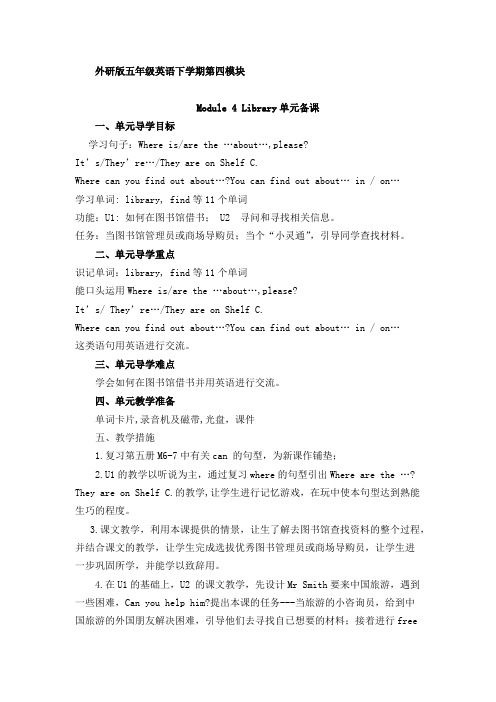
外研版五年级英语下学期第四模块Module 4 Library单元备课一、单元导学目标学习句子:Where is/are the …about…,please?It’s/They’re…/They are on Shelf C.Where can you find out about…?You can find out about… in / on…学习单词: library, find等11个单词功能:U1: 如何在图书馆借书; U2 寻问和寻找相关信息。
任务:当图书馆管理员或商场导购员;当个“小灵通”,引导同学查找材料。
二、单元导学重点识记单词:library, find等11个单词能口头运用Where is/are the …about…,please?It’s/ They’re…/They are on Shelf C.Where can you find out about…?You can find out about… in / on…这类语句用英语进行交流。
三、单元导学难点学会如何在图书馆借书并用英语进行交流。
四、单元教学准备单词卡片,录音机及磁带,光盘,课件五、教学措施1.复习第五册M6-7中有关can 的句型,为新课作铺垫;2.U1的教学以听说为主,通过复习where的句型引出Where are the …? They are on Shelf C.的教学,让学生进行记忆游戏,在玩中使本句型达到熟能生巧的程度。
3.课文教学,利用本课提供的情景,让生了解去图书馆查找资料的整个过程,并结合课文的教学,让学生完成选拔优秀图书管理员或商场导购员,让学生进一步巩固所学,并能学以致辞用。
4.在U1的基础上,U2 的课文教学,先设计Mr Smith要来中国旅游,遇到一些困难,Can you help him?提出本课的任务---当旅游的小咨询员,给到中国旅游的外国朋友解决困难,引导他们去寻找自已想要的材料;接着进行freetalk,师问“Where can you find out about animals/ weather…?发散学生的思维,让学生竭尽所能,实现课堂上知识的滚动,进而引导学生学说:We can find out the books in the library/ in the dictionary/ in the CD-ROM/in the newspaper/in the timetable/ at the zoo/ on TV/….5.通过师生听音、讨论和学习课文,最后完成旅游小咨询员的任务,再次巩固新句型;6.本课的任务也可以设计为“当生活中的小灵通”,同样能很好地拓展本课的知识。
外研版英语六年级下册Module-4-模块ppt课件
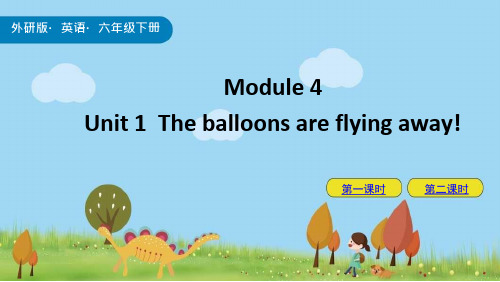
Homework
1.向家人展示自己跟读模仿课文录音的
情况。
2.将Listen and chant.唱给爸爸妈妈听 。
外研版· 英语· 六年级下册
Module 4 Unit 2 The apples are falling down
the stairs.
第一课时
第二课时
第一课时
Look, a panda is falling!
3. How are the balloons? They are flying away.
Practise.
Look and write. Then act them out.
My books are falling. Who can help me? Sorry, I can’t. I can help you.
Daming: I can help you. I can carry this box. Simon’s mum: Thank you, Daming.
Practise.
Daming: Where is your mum? Simon: She’s at thesupermarket. She’s buying things
Make conversations.
一名同学周末过生日,将举办生日聚会,并想邀请一 些同学参加。小组创编对话,并进行表演。
eg:
A: This weekend is my birthday. Can you come
to my birthday party?
B: Yes, I’d love to. C: Sorry, I can’t. I am going to visit my uncle. D: Sorry, I can’t. I will study for a test. E: …
外研版高中英语必修二Module4知识详解
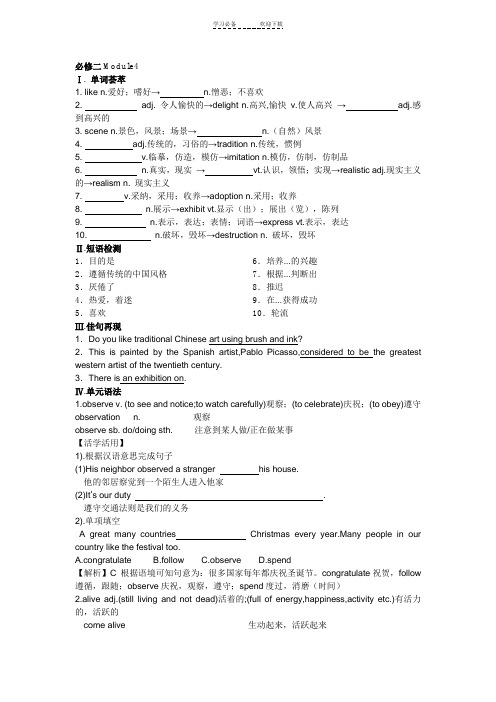
必修二Module4Ⅰ. 单词荟萃1. like n.爱好;嗜好→n.憎恶;不喜欢2. adj. 令人愉快的→delight n.高兴,愉快v.使人高兴→adj.感到高兴的3. scene n.景色,风景;场景→n.(自然)风景4. adj.传统的,习俗的→tradition n.传统,惯例5. v.临摹,仿造,模仿→imitation n.模仿,仿制,仿制品6. n.真实,现实→vt.认识,领悟;实现→realistic adj.现实主义的→realism n. 现实主义7. v.采纳,采用;收养→adoption n.采用;收养8. n.展示→exhibit vt.显示(出);展出(览),陈列9. n.表示,表达;表情;词语→express vt.表示,表达10. n.破坏,毁坏→destruction n. 破坏,毁坏Ⅱ.短语检测1.目的是6.培养...的兴趣2.遵循传统的中国风格7.根据...判断出3.厌倦了8.推迟4.热爱,着迷9.在...获得成功5.喜欢10.轮流Ⅲ.佳句再现1.Do you like traditional Chinese art using brush and ink?2.This is painted by the Spanish artist,Pablo Picasso,considered to be the greatest western artist of the twentieth century.3.There is an exhibition on.Ⅳ.单元语法1.observe v. (to see and notice;to watch carefully)观察;(to celebrate)庆祝;(to obey)遵守observation n. 观察observe sb. do/doing sth. 注意到某人做/正在做某事【活学活用】1).根据汉语意思完成句子(1)His neighbor observed a stranger his house.他的邻居察觉到一个陌生人进入他家(2)It’s our duty .遵守交通法则是我们的义务2).单项填空A great many countries Christmas every year.Many people in our country like the festival too.A.congratulateB.followC.observeD.spend【解析】C 根据语境可知句意为:很多国家每年都庆祝圣诞节。
外研版高中英语选修六Module4

单词1.relative n.[C]亲属,亲戚adj.相关的;比较的,相对的归纳拓展(1)relative pronoun关系代词relative to...与……有关的,关于或涉及……的relatively adv.相对地;比较地relatively speaking相对来说relativity n.相对论(2)relate vt.&vi.(有)关联;关系;讲述,叙述relate sth.to sb.向某人叙述/讲某事be relate sth.to/with sth.将某事物与另一事物相联系relate to sb./sth.与某人/某事物有关,涉及某人/某事物(3)related adj.有关的;有关联的be related to与某人/某物有关联relation n.亲戚;亲属;关系in relation to有关,关于,涉及例句:I've also got some time to visit some relatives.我也还有一点儿时间去看望亲戚。
The report relates high wages to/with labour shortages.该报告把高工资与劳动力短缺联系在一起。
Relatively speaking,it’s not important.相对而言,这并不重要。
I have a lot to say in relation to that affair.关于那件事,我有好多话要说。
【链接训练】When we say a body is at rest,we mean only its position is relative ________ something fixed.A.with B.to C.at D.on【解析】句意为:当我们说某一物体处于静止状态时,我们仅仅是指它的位置与某个固定物相对不变。
be relative to是固定用法,意为“与……相对的”。
4AM4知识点整理

一、词汇hay 干草(不可数) grass 草(不可数) meat 肉(不可数) corn 玉米, 谷物(不可数) farm 农场 visit 拜访,参观 bin 箱子 rubbish 垃圾(不可数) rubbish bin 垃圾箱 here 这儿 there 那儿 everywhere 到处throw 扔 stone 石头 litter 乱扔(垃圾) pick 摘scarf 围巾 skateboard 滑板 fast and far 又快又远Quack-quack! (ducks)鸭子叫声Oink-oink! (pigs) 猪叫声Nay-nay! (horses)马叫声Bar-bar! (sheep) 羊叫声Moo-moo! (cows)牛叫声live in a pen 居住在围栏里throw stones扔石头on the farm 在农场上visit the farm参观农场feed the animals 喂养动物outside the pen 在围栏的外面 swing his two big ears 扇动大耳朵Old MacDonald’s farm 老麦克唐纳的农场 feed the pig with corn 用谷物喂猪wear a red scarf 戴着一条围巾 skate on the skateboard 滑滑板put the rubbish in the rubbish bin 把垃圾放入垃圾箱二、句型1. Don’t …后面跟动词原形,表示叫对方不要做某事。
Don’不要扔垃圾Don’t walk on the grass. 不要在草地上散步。
Don’t pick flowers. 不要摘花。
Don’t throw stones. 不要扔石头。
(注:以上句型可用Youcan’t… 的句型作转换 , 如oucan’tthrow stone s. ”)2. Let’s… 后面跟动词原形,表示邀请对方和自己一起做某事。
外研版(三起)-英语-五年级上册-第四模块归纳

外研版(三年级起点)五年级英语module 4重点归纳单词学习:1、pair of :a pair of eyes 一双眼睛例句:He has a pair of beautiful eyes.a pair of sports shoes 一双运动鞋a pair of shorts 一条短裤2、argue: argue with sb. 和某人争吵例句:Daming argue with his sister.大名和他的姐姐在在争吵Don’t argue! 别吵了!短语延伸:Don’t worry! 别担心!3、matter:What’s the matter?怎么啦?短语延伸:what’s wrong?怎么了?4、took(take的过去式)拿(走),取(走)例句:Amy took my sweater. Amy拿走了我的毛衣。
5、wear 穿(过去式:wore)例句:He wants to wear my new sports shoes. (注意:第三人称单数的用法)他想穿我的新运动鞋I want to wear this trousers.我想穿这条裤子。
6、That’s OK. 没关系。
7、hey 嘿,喂学过的有关打招呼的单词:hello hi词形的转换:What’s the matter?中What’s是what is 的缩写形式。
That’s OK.中That’s是that is 的缩写形式。
关于服饰的单词:Shorts 短裤trousers 裤子cloth 衣服(复数:clothes)bag 包T-shirt T恤,短袖汗衫; Cap 帽子hat 帽子sports shoes 运动鞋。
外研版三年级上册英语第四模块单词课文

外研版三年级上册英语第四模块单词课文:Module4 Unit 1 I can jump far 1.Listen , point and say .I can jump . I can jump , too .I can run fast . Oh no !2.Listen , point and find “can, can’t”Sam:Amy , can you run fast ? Yes , I can .Amy :Aah! I’m the winner . You can’t run fast . You are slow.Sam:I can jump far . Let’s see !Sam:I can’t jump far .Amy:Ha! I’m the winner .Amy:Can you jump far ?Sam:No , I can’t . But I can swim here !Amy and Sam :Ha ha…3.Listen and say .Can you run fast ?Yes,I can .I can’t jump far .Module4 Unit21.Listen,point and say .What can you see ?I can see a bird .Help !2.Listen and say .Ms Smart:Look at the picture ! What can you see ?Amy:Ican see a bird. It can fly .Daming:I can see a bird , too . It can’t fly .Ms Smart:Look at the picture ! What can you see ?Daming:I can see a koala. It can climb .Daming:I can see a koala , too . It can’t climb . It can cry . Ha ha …单词:Module 4far 远fast 快,快速地winner 胜利者can’t = cannot 不能slow 慢的fly 飞koala 树袋熊,考拉climb 爬cry 哭。
Module4_词句精讲精练
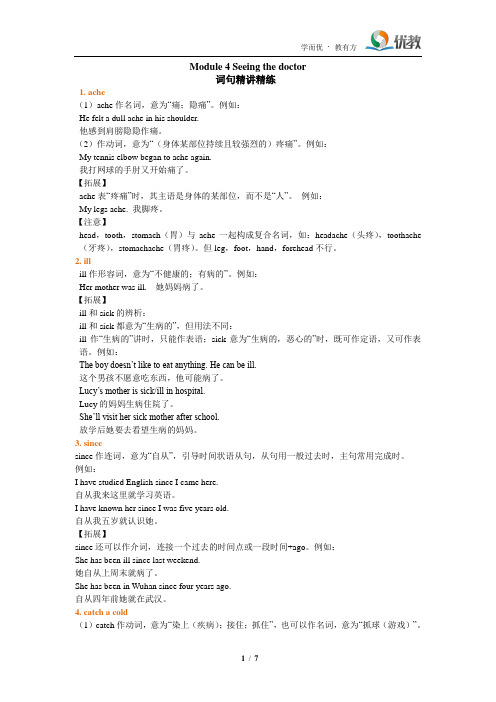
Module 4 Seeing the doctor词句精讲精练1. ache(1)ache作名词,意为“痛;隐痛”。
例如:He felt a dull ache in his shoulder.他感到肩膀隐隐作痛。
(2)作动词,意为“(身体某部位持续且较强烈的)疼痛”。
例如:My tennis elbow began to ache again.我打网球的手肘又开始痛了。
【拓展】ache表“疼痛”时,其主语是身体的某部位,而不是“人”。
例如:My legs ache. 我脚疼。
【注意】head,tooth,stomach(胃)与ache一起构成复合名词,如:headache(头疼),toothache (牙疼),stomachache(胃疼)。
但leg,foot,hand,forehead不行。
2. illill作形容词,意为“不健康的;有病的”。
例如:Her mother was ill.她妈妈病了。
【拓展】ill和sick的辨析:ill和sick都意为“生病的”,但用法不同:ill作“生病的”讲时,只能作表语;sick意为“生病的,恶心的”时,既可作定语,又可作表语。
例如:The boy doesn’t like to eat anything. He can be ill.这个男孩不愿意吃东西,他可能病了。
Lucy’s mother is sick/ill in hospital.Lucy的妈妈生病住院了。
She’ll visit her sick mother after school.放学后她要去看望生病的妈妈。
3. sincesince作连词,意为“自从”,引导时间状语从句,从句用一般过去时,主句常用完成时。
例如:I have studied English since I came here.自从我来这里就学习英语。
I have known her since I was five years old.自从我五岁就认识她。
外研版高中英语必修三Module4完全知识点

hurricane
tornado
earthquake
Natural Disasters
sandstorm
lightning
volcanic eruption
Central Asia
A B
North America Central Africa
C
Australia
D
A
Xinjian g
他们挤在一起,免受风吹。
7.have an effect on对„„有影响
Smoking has a bad effect on health.
吸烟对身体有不良影响。 The radiation leak has had a disastrous effect on/upon the environment.
核辐射泄漏给环境带来了灾难性的影响。
与effect构成的短语 be of no effect无效
be in effect有效
come/go into effect生效 put/carry/bring sth. into effect使生效、实现 take effect生效;开始发挥作用 in effect实际上;简直是;事实上
We were stopped/prevented/kept from going out by the heavy
rain. 大雨使我们无法外出来自 (2)protect...from...中 from后接能带来伤害或损害之物。如:
Module 4 单元(教案)外研版(三起)英语三年级上册

Module 4 单元(教案)外研版(三起)英语三年级上册一、教学目标通过本课教学,学生能够:1.熟练掌握动词组 be good at 和动词短语 like doing sth. 的用法;2.通过本单元学习的词汇及句型,能够描述自己和他人的技能和爱好;3.通过小组合作,能够向他人介绍自己和他人的技能和爱好。
二、教学重点1.动词组 be good at 的用法;2.动词短语 like doing sth. 的用法;3.描述自己和他人的技能和爱好。
三、教学难点小组合作,向他人介绍自己和他人的技能和爱好。
四、教学准备1.教师:黑板、彩色粉笔、小白板、教学课件;2.学生:课本、练习册。
五、教学过程1. Warming-up(1)Greeting:T: Good morning, boys and girls!S: Good morning, Miss/Mr…T: Nice to see you again. How are you today?S: I’m fine, thank you.T: Good. Now let’s begin our class.(2)Revision:T: Do you still remember what we learned in the last lesson? S: Yes, we learned how to describe something using adjectives.T: Very good. Can you give me an example?S: Of course. It’s a big cat.T: Great. Now let’s move on to our new lesson.2. Presentation(1)Teaching new words:T: Now look at the screen. What can you see?S: A picture.T: Yes, and what’s in the picture?S: A boy and a girl.T: Right. Do you know their names?S: No, we don’t.T: OK. Their names are Jack and Sarah. Now let’s learn some new words. Please look at the screen.(2)Teaching new sentence:T: OK. Now let’s learn a new sentence. Please repeat after me.S: OK.T: Jack is good at playing basketball.S: Jack is good at playing basketball.T: Very good. Do you know what。
小学英语外研版(一起)四上M4知识点总结

Module 4知识点总结一、短语:1. Chinese people2. invent printing3. print newspapers4. invent paper5. look at6. beside the house7. in front of8. between the two cars9.a week ago二、句子:1. Chinese people invented many important things.2. Chinese people invented paper.3. We print books and newspapers4. That’s right.5. I printed our class newspaper yesterday.6. Look, it’s between the chairs.7. Chinese people didn’t invent bicycle.8. He invented this bicycle.9. The mouse is in front of the cat.10. Look at the man beside the bicycle.11. He was from the UK.12. What a good idea! 一、短语意思:1. 中国人2. 发明印刷术3. 印报纸4. 发明纸5. 看6. 在房子旁边7. 在......前面8. 在两辆车中间9. 一周以前二、句子意思:1. 中国人发明了许多重要的事物。
2. 中国人发明了纸。
3. 我们印刷书和报纸。
4. 没错。
5. 昨天我印刷了班报。
6. 看,它在椅子中间。
7. 中国人没有发明自行车。
8. 他发明了这辆自行车。
9. 老鼠在猫的前面。
10. 看那个在自行车旁边的人。
11. 他曾来自英国。
12. 多好的主意啊!13. Chinese people invented printing for us.14.Now the pen is between the ruler and the pencil.15.Who was in front of you last Monday. 13. 中国人为我们发明了印刷术。
module 4 单词
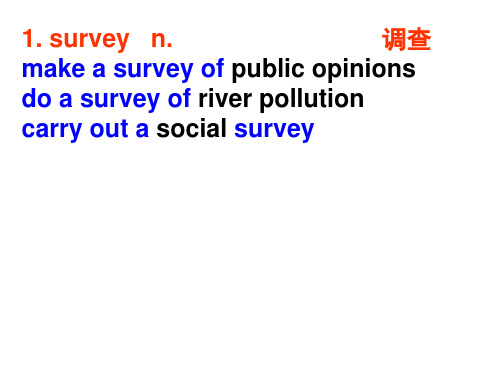
3. local
adj. 1)地方的,当地的,本地的
2) 局部的
local news local government local customs local pain
4. n. • suburb • countryside • downtown
adj. • suburban • rural • urban
11. approach v./ n. 1)(空间上或时间上)接近 --As you approach the town, the first building you see is the church. --With summer approaching, it’s getting hotter and hotter. --She hadn’t heard his approach and jump as the door opened. n. 2)方法,步骤(to sth/doing sth) --Nine in ten parents said their approach to educating their children was nothing like that of their parents.
n. 3)途径,通道 --The major approaches to the meeting hall are guarded by the police. v. 同…联系,找…商量,
找…提出建议(或要求):
--Have you approached the manager about taking a day off next week? 你是否同经理谈过下周请一天假的事? --Did Mary approach you about lending her some money? 玛丽找你商量过有关借钱给她的事吗?
- 1、下载文档前请自行甄别文档内容的完整性,平台不提供额外的编辑、内容补充、找答案等附加服务。
- 2、"仅部分预览"的文档,不可在线预览部分如存在完整性等问题,可反馈申请退款(可完整预览的文档不适用该条件!)。
- 3、如文档侵犯您的权益,请联系客服反馈,我们会尽快为您处理(人工客服工作时间:9:00-18:30)。
Module 4 Sandstorms in Asia§Period I Introduction and Reading课型:新授课编写人:李玲雷晓靓审核人:时间:第周星期班___组姓名______使用说明:1.课前认真阅读题目,完成自主学习的有关内容;2.课上认真思考,积极讨论,大胆展示自己,发挥小组合作优势;3.教学内容:外研版英语必修三module4,第31-40页。
一、教学目标1. 通过阅读文章,学生可以查找出相关信息,熟悉文章大意,总结文章主旨并能够复述个别段落;2. 学习此篇文章之后,学生了解到自然灾害的预防和控制,且具有保护绿化环境的意识。
二、教学重点、难点1.重点: 关于自然灾害的词汇,亚洲沙尘暴的概况;2.难点: 能读懂文章并且理解语段之间的逻辑关系,从中获取信息并回答相关问题。
三、自主学习1. 完成课本P31 Activity 1 & 2。
2. 快速阅读Reading and Vocabulary,完成下列表格。
四、合作探究1. A government campaign has been started to help solve the sandstorm problem.( )2. The winds in a sandstorm can sometimes prevent you from seeing the sun. ( )3. Northwest China is the sandstorm centre in Central Asia. ( )4. The Chinese Central Weather Station can only forecast a sandstorm some monthsbefore it arrives. ( )5. It is frightening to be cycling in a sandstorm. ( )6. The government is planting trees to the east of Beijing to prevent the desert coming nearer. ( )五、课堂检测A desert is a beautiful land of silence and space. The sun shines, the wind blows, and time and space seem endless. Nothing is soft. The sand and rocks are hard, and many of the plants even have hard needles instead of leaves. The size and location of the world’s deserts are always changing. Over millions of years, as climates change and mountains rise, new dry and wet areas develop. But within the last 100 yeas, deserts have been growing at a frightening speed. This is partly because of natural changes, but the greatest makers are humans. Humans can make deserts, but humans can also prevent their growth. Algeria Mauritania is planting a similar wall around Nouakchott, the capital. Iran puts a thin covering of petroleum (石油) on sandy areas and plants trees. The oil keeps the water and small trees in the land, and men on motorcycles keep the sheep and goats away. The USSR and India are building long canals to bring water to desert areas.1. In this passage, “needles” refer s to ___.A. small, thin pieces of steel.B. long, thin pieces of branches.C. small pointed growth on the stem (茎) of a plant.D. small, thin pieces of sticks.2. Which of the following is NOT true?A. The greatest desert makers are humans.B. There aren’t any living things in the deserts.C. Deserts have been growing quickly.D. The size of the deserts is always changing.3. People in some countries are fighting a battle against __.A. the growth of desertsB. the disappearance of desert plantsC. natural changesD. congenital climate4. We can guess that Mauritania and Algeria belong to __.A. Asian countriesB. American countriesC. European countiesD. African countries六、总结与反思【方法】【思想】【疑惑】§ Period II Language points一、教学目标1.理解并会用重点词汇和句型;2.并深刻理解文章内容。
三、教学重点、难点1.重点:文章中相关词汇和句型;2.难点:如何正确使用所学词汇和句型。
三、自主学习1.阅读文章,写出相对应的单词或单词意思。
damage________ protect_______ forecast________污染v.________ recycle_______ 主要的______ campaign_______ dune__________ blow frighten dig prevent________ 2.查找资料,完成下列练习。
a. majoradj. _____ ______ ______ n. ____ _____ vi. _____ _____翻译:环境污染已经成为一个主要的社会问题。
_______________________________________________.b. the way to do sth/of doing sththe way that/ in which +句子造句:____________________________________________________________________________c. To have been caught in a sandstorm was a terrible experience.翻译:_______________________________________此句是__________的被动语态作主语。
be caught in _________catch sb doing sth:________________d. Sandstorms in China appear to have increased in recent years.翻译:_____________________________________________appear to = ___________ 意思是___________i. wake up vi.________wake sb up vt.________wake up to sth. ________ 等于v. re____j. 翻译:请明早八点三十叫醒我。
_______________________________我最后才认识到自己的错误。
___________________________ awake:adj.____________在句中只作_____语和后置_______语。
四、合作探究1.There was nothing to be done. There was nothing to do.比较两句有什么不同。
2.It was the most frightening and the most dangerous situation I’ ve ever been in. 翻译并说明I’ ve ev er been in在句中充当什么成分。
3.Sandstorms in China appear to have increased in recent years as a result of “desertification”. 翻译as a result of_______________五、课堂检测1. So badly _____ that he had to be taken to the hospital.A. he was injuredB. injured was heC. was he injuredD. injured he was2.The chairman thought ______ necessary to invite Professor Smith to speak at the meeting.A. ThatB. itC. thisD. him3.Robert is said ____ abroad for two years, but I don’t know which country he is studying in.A. to have studiedB. to studyC. to be studyingD. to have been studying4.Do let your mother know all the truth. She appears ____ everything.A. to tellB. to be toldC. to be tellingD. to have been told5.He may _____ a fool but actually he is quite clever.A. seemB. lookC. appearD. A&C6. The houses ______ are for the teachers and construction work will soon start.A. builtB. to be builtC. to buildD. being built7. He would love ______ to your birthday party but he had to work extra hours to finish a report.A. goingB. having goneC. to goD. to have gone六、总结与反思【方法】【思想】【疑惑】§Period III Grammar 1 and Grammar 2一、教学目标1. 学生能够正确使用不定式造句;2. 学生可以正确使用不定式的各种时态和语态.二、教学重点、难点1. 重点:动词不定式的各种时态。
